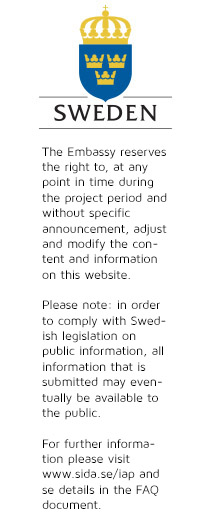- The likelihood that the project will be commercially successful and provide a clear added value for the future of the enterprise or business venture. Projects with no or very small such possibilities will not be accepted.
- The quality of the proposal in terms of how the company differentiates itself from the competition, how novel the project is, the sustainability of the revenue model, scalability, the market opportunity and the management team.
- The “additionally “ and “value added” of the project to the BiH economy in terms of innovation, technology transfer, etc. if successful.
- The potential employment effect directly or indirectly through sub-contracting, out-grower schemes etc. Youth employment and female employment will have a premium.
- The export potential (projects aimed entirely for the local market are not excluded, but export-orientation is a premium). Projects adjusted to and aimed at the EU market will have a premium.
- Projects of a joint venture character and which have a potential of create sustained links between Sweden and BiH will have a premium. Note: For companies in BiH there might be ‘Swedish or Scandinavian connection’ such as an established business relationships, intended marketing towards Scandinavia, a planned joint venture, sourcing of technology from Scandinavia, etc.
- Projects taking place outside the main cities will be given a premium in the selection process to promote a balanced regional development.
- Projects which have a clear positive environmental and climate dimension will be given a premium. Projects which do not fulfill basic environmental standards will not be accepted.
- The credibility of the entrepreneur behind the project. Success of new business ventures depends to a very large extent on the entrepreneur. The background of the entrepreneur will be assessed in the second selection phase.
- The project team or entrepreneur’s willingness to commit to demands of follow-up, evaluation and effect analysis of the project, even after the project phase has ended.
The criteria above will be used to rank the applications. Applications not fulfilling the application criteria, read Who can apply?, will not be assessed.
Additional advice
For your application to receive the higher scores it is necessary for the project proposal to have an additional dimension apart from the grant being economically beneficial for your company. It is absolutely essential that the positive impact on others, such as for example your community, the environment, societal effects etc., are discussed and highlighted. Hence, present both the direct impact (the positive effects for your company) and the indirect (societal) impact in your application.
At the same time the applying enterprise should thoroughly present revenue streams, costs and profit forecasts with relation to the project proposal in the application form. Exactly how do you predict the profit to increase with the implementation of this project? The proposals which scored highly in the first call for proposals presented a detailed plan in their application.
Finally, the winners of the first call for proposals all score highly in relation to the first three selection criteria mentioned above. We therefore suggest that you focus on highlighting whichever one of these is most applicable to your project proposal in your application.

